
Jim Fetzer, The Holocaust Narrative: Politics trumps Science
by Jim Fetzer
[NOTE: Because of the great interest shown in my research on the Holocaust–which, like my work on JFK, 9/11 and other events, such as Sandy Hook and the Boston bombing, has been in collaboration with other students–I am republishing it here in order to preserve it on the record.]
“The fastest way to get expelled from a British university is by saying you are looking at chemical evidence for how Zyklon was used in World War II, with a discussion of how delousing technology functioned in the German World War II labour camps”—Nicholas Kollerstrom
For more on the book, click BREAKING THE SPELL
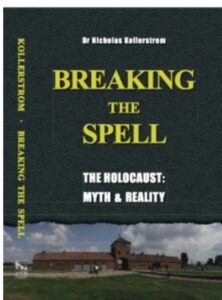
The author of this refreshing scientific study of the Holocaust, Nicholas Kollerstrom, may be the most honorable man whom I have ever had the pleasure to know.
In response to PM David Cameron’s denunciation of 7/7 and 9/11 skeptics as on a par with ISIS, he went to Scotland Yard with a copy of Terror on the Tube (3rd ed., 2011) and turned himself in.
Scotland Yard declined the honor, but this act–which symbolically castrated the PM’s outrageous stance–was a striking illustration of his ability to tackle a problem by going right at it.
A distinguished historian of science with multiple degrees, including from Cambridge, he has published on 9/11 and especially 7/7, about which he appears to be the world’s leading expert.
When his attention turned to research on the use of Zykon B as a delousing agent in the labor camps run by the Germans during World War II, however, he was treated as an outcast.
He lost his position at University College London, which he had held for 15 years, where university officials did not bother to extend the opportunity of a rebuttal before they sacked him.
He and I both spoke at the recent conference, “Academic Freedom: Are there limits to inquiry? JFK, 9/11 and the Holocaust”, where this book reports the results of the research for which he was banned. The book, a stunning historic expose, has just appeared. I endorse it with my highest recommendation.
The Holocaust – Myth and Reality
The situation is completely absurd. No subject generates responses as extreme and irrational as what has come to be known as “the Holocaust”. Unlike any other event in human history, including even the most sacred religious beliefs, for anyone to question, dispute or deny its occurrence qualifies as “a hate crime,” where Holocaust denial is even a prosecutable offense in certain jurisdictions. Unlike any other, this crime involves the expression of forbidden thoughts about a subject that has become taboo.

The underlying desideratum is whether history is supposed to be accurate and true or, as Voltaire has put it, be merely “a pack of lies the living play upon the dead”. Just so we know what we are talking about: In its broadest outlines, “the Holocaust” can be defined by means of its three primary elements, which I shall designate here as hypotheses (h1), (h2) and (h3):
(h1) that Hitler was attempting to exterminate the Jews and succeeded by putting around 6,000,000 to death;
(h2) that many of those deaths were brought about by the use of cyanide gas in chambers for that purpose; and,
(h3) that the chemical agent that brought about those deaths was Zykon B, to which the victims were subjected.
The science of the Holocaust does not leave any room for doubt about (h2) and (h3), insofar as the laws of biochemistry and of materials science—laws which cannot be violated and cannot be changed—entail that the bodies of those who are put to death using cyanide turn pink, while the walls of chambers used for that purpose would turn blue. But none of the bodies from those camps has been reported to have been pink; and empirical examination of the “gas chambers” has determined that, unlike the walls of the delousing chambers, none of them turned blue. Which means that (h2) and (h3) are not simply false but have been scientifically refuted.
Holocaust science “cut and dried”
As Nicholas Kollerstrom documents in this astonishing and brilliant book, the science of the Holocaust is this “cut and dried”. To the extent to which the Holocaust narrative depends on (h2) and (h3), therefore, it cannot be sustained. The questions that remain about (h1) are a bit more complex but appear to be equally contrived. There are more than 236 references to 6,000,000 Jews who are either in acute distress or about to be assailed in the newspapers of the world prior to the Nuremberg Tribunal— the first of which appeared in 1890. The number seems to have no basis in fact but to have theological origins—from a disputed passage in Leviticus—as to how many Jews must perish before they can return to “The Promised Land”.
To the extent to which the number of Jews who died in the camps can be objectively determined, the most reliable numbers appear to come from the records of the International Committee of the Red Cross, which visited the camps and kept meticulous records of the identities of those who died and their cause of death. Not one is reported to have been put to death in gas chambers, and the total it reported in 1993 for all of the camps was 296,081 combined. Even rounding up to an even 600,000 victims—gypsies, Jews and the mentally and physically infirm—the empirical evidence thus contradicts the contention that 6,000,000 Jews were put to death and thereby falsifies hypothesis (h1).
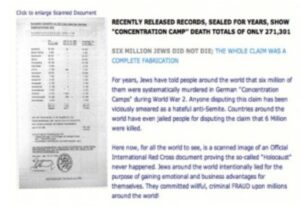
Counting deaths attributed to the Holocaust—apart from the records of the International Committee of the Red Cross—turns out to be an exercise in “fuzzy math”, because none of them add up. As Faurisson observed during an interview on 13 December 2006, the Yad Vashem database was built up by “simple unverified declarations emanating from unverified sources and processed in such a way that one and the same person can be recorded as having died several times, even, it seems, as many as ten times”.[1] And even the most complete archives are not collated to make total numbers accessible but only individual cases—which appears an obvious measure to preserve the untestability of (h1), the hypothesis that 6,000,000 Jews had perished.
Holocaust story falsified
So, insofar as we depend upon empirical evidence and laws of science, the Holocaust story appears to be false and cannot be sustained. The question that therefore arises is how the Nuremberg Tribunal—widely cited as a paragon of intellectual integrity and of the application of moral principles to historical events—could possibly have produced such a highly misleading account of crucial events at the conclusion of World War II. The answer to this, I believe, has been provided by Robert Faurisson in his paper “Against Hollywoodism, Revisionism,” who explains the daunting task confronting the Allies to conceal or justify war crimes that they had committed in winning the war.[2]
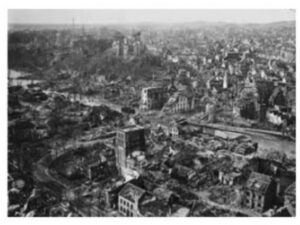
The Allies’ systematic and massive destruction of German cities not only brought about the deaths of hundreds of thousands of German civilians but also interdicted the railroad lines that would have re-supplied those camps, which were located near major industrial plants and whose inmates were providing labor to run them. It would have been poor business practice to exterminate the work force, but the large number of deaths from starvation because the Third Reich could not re-supply them provided an opportunity to deflect responsibility from the Allies onto Germany, which the Allies seized. A Hollywood director was brought in and shot 80,000 feet of film at the camps, where 6,000 feet (7.5% of the total) was used to shift the blame for those deaths onto Nazi Germany, which was an easy sell, all things considered.
As Kollerstrom explains, Zyklon B was used at the labor camps, not as a method of extermination but for the sake of maintaining hygiene among the inmates. Typhus and dysentery were omnipresent problems, where Zyklon B was applied in copious quantities—but as a disinfestant, not as an agent for bringing about the deaths of millions of inmates. And in response to the color pink-and-blue findings, an alternative explanation has been given that they were killed using diesel exhaust fumes, but unlike carbon monoxide, diesel exhaust fumes bring about nausea and severe headaches but usually do not bring about death by asphyxiation.
Classified British documents
Among the most valuable contributions of this study derives from Nick’s use of classified records acquired by British authorities, who were skeptical of claims that mass gassings were being carried out and had reports in hand of the use of Zyklon for the purpose of delousing the inmates, where infestations had become alarming. Many tons of Zyklon were consumed at Auschwitz-Birkenau from the summer of 1942 on, as Kollerstrom reports, which is easy to confirm because it soaked into the walls of the disinfestation chambers and is still there. His essays on the subject—“The Walls of Auschwitz”, “Leuchter Twenty Years On” and “The Auschwitz Gas Chamber Illusion”[3]—would become the cause of his removal from a post-doctoral post he had held for 15 years!
As a professional philosopher of science, I appreciate Nick’s references to Sir Karl Popper, who advocated the method of falsificationism, whereby the truth of theories in science and in history can be tested by attempts to falsify them. When they resist our best efforts to refute them, then we have good reason to believe they might be true. But equally applicable here are the reflections of Imre Lakatos, who discussed research programs with hard cores of claims,[4] such as Newton’s laws of motion or, in the case we are considering, the above-mentioned hypotheses (h1), (h2) and (h3). When the defenders of these hypotheses are confronted by the risk of refutation, they can appeal to auxiliary hypotheses in an attempt to deflect the refuting data and thereby preserve their theory.
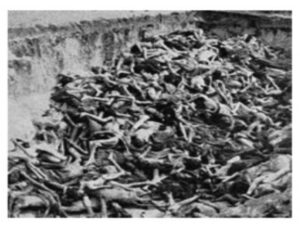
A stellar example arises in the context of the attempt to explain away why the number of those who died as substantiated by the meticulous records of the Red Cross supports the inference that less than 10% of the 6,000,000 claimed actually died from all causes—and none from death in gas chambers. To cope with that finding, the claim has been made that the records are incomplete because large numbers of Jews were taken directly to the gas chambers and never registered—not even by name. Not only are contentions of this kind unfalsifiable, untestable and hence unscientific, but they reflect the degenerating character of the Holocaust paradigm, which has spawned no new data or research that could possibly overcome the mountain of evidence against it.
Excluding falsifying data
Another method for immunizing a hypothesis from refutation is by the exclusion of falsifying data.[5] The defenders of hypotheses (h1)-(h3) have committed a mind-boggling example of fallacious science, which further manifests their commitment to a degenerating research program. When the Auschwitz museum was confronted with the fact that the innocuous delousing chambers at Auschwitz have blue walls—due to being saturated with blue iron cyanide compounds—but the alleged homicidal gas chambers have not, they commissioned their own chemical research. Instead of testing wall samples for the chemicals that had caused the blue stains, the researchers they commissioned simply excluded those chemicals from their analysis by employing a procedure that could not detect them.[6]
They justified this measure with the claim that they did not understand exactly how these compounds could form and that they might therefore be mere artifacts. Researchers who don’t understand what they are investigating have no business becoming involved. In this case, however, it appears to be deliberate. They have deliberately ignored an obvious explanation—that Zyklon B was only used for delousing—which would have remedied their lack of comprehension.[7] As a result of this failure to adhere to the principles of science, they produced a report of no scientific value, which they used to arrive at a predetermined conclusion.[8]
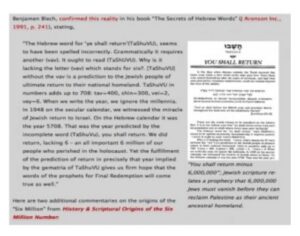
That Nicholas Kollerstrom was booted from his post at University College, London—and without any hearing or opportunity to present his defense, where the truth of his observations, one might have thought, would have made a difference—is one of a large number of indications that even our best academic institutions and societies are not capable of dealing objectively with the history of World War II. Indeed, it struck me like a bolt of lightning out of the blue when, during a talk by Gilad Atzmon in Madison, Wisconsin, about Jewish identity politics, I realized that the Holocaust mythology benefits Zionism and the government of Israel by playing, in the promotion of its political agenda, upon a Western sense of guilt for the death of 6,000,000 Jews during World War II.
The claim that someone is “anti-Semitic” or a “Holocaust denier” is taken to be the most severe form of ethical damnation possible in this time and age. But distinctions must be drawn between criticism of the acts and policies of the Israeli government and discounting the worth or value of human beings on the basis of their ethnic origins or religious orientation. Condemning the Israeli government for its vicious and unwarranted onslaught of the people of Gaza, for example, is not “anti-Semitic”. And if exposing the Holocaust narrative as political propaganda makes one a “Holocaust denier,” all of us who put truth before politics ought to wear that label as a badge of honor.
The ISIS fiasco
As an illustration of the depths of depravity of those who would uphold the myth, consider that, as an historian of science, Kollerstrom was invited to contribute three entries—including that on Sir Isaac Newton, which is the most important—to theBiographical Encyclopedia of Astronomers (2007), which has more than 1550 entries by some 400 authors from 40 countries. Yet Noel M. Swerdlow of the University of Chicago, a reviewer for Isis, the journal of America’s History of Science Society, recommended that the book be sent back to the publisher andpulped because Kollerstrom had been involved in research on the Holocaust! This was such an outrage that I wrote to the editorial board ofIsis, which allowed a Letter to the Editor to appear.

Something is terribly wrong, when the world’s leading society on the history of science does no more to correct a grotesque abuse by one of its reviewers on a book that involved so many contributors and an enormous investment in time and money, where the moral issues are so blatant and obvious. It is ironic that the Nuremberg Tribunal would declare “collective punishment” a war crime. The Allies were responsible for the collective punishment of German civilians by their systematic bombing of German cities. Isis has committed a comparable intellectual crime by tolerating collective punishment of 400 scholars for the purported offenses of one. By acquiescing to its reviewer’s abuse, Isis has committed the fallacy of guilt by association and has displayed an appalling lack of journalistic ethics.
Nick Kollerstrom is the only party here who has displayed a commitment to exposing falsehoods and revealing truths. His defense is very simple: the hypotheses on which the Holocaust narrative has been based are provably false and not even scientifically possible. I have written about this in my articles “The War on Truth: Research on the Holocaust can end your career,”[9] “ISIS trips, stumbles and falls,”[10] and discussed it during my presentation at the 2014 conference “Academic Freedom: Are there limits to inquiry? JFK, 9/11 and the Holocaust,” at which Nick and I both spoke.[11]
But far better than reviewing them, read this brilliant study by the world’s leading iconoclast, Nick Kollerstrom, my dear friend, whom I admire beyond words as a splendid example of what historians should be doing in their professional work by getting history straight—lest Voltaire’s admonition continue to apply—including about the atrocities of World War II. There were real atrocities committed by all sides, just not the ones about which we have been told.
References
[1] “Interview with Professor Robert Faurisson at the Guest House of the Ministry of Foreign Affairs of the Islamic Republic of Iran,” www.robertfaurisson.blogspot.com, December 13, 2006.
[2] Ibid., February 3, 2012.
[3] See Nick’s online papers at www.codoh.com/library/authors/1580/
[4] Imre Lakatos, Alan Musgrave (eds.), Criticism and the Growth of Knowledge, Cambridge University Press, Cambridge 1970.
[5] Sir Karl Popper systematically investigated the diverse methods of immunizing theories in his The Logic of Scientific Discovery, Hutchinson & Co., London 1968, pp. 82-97.
[6] Jan Markiewicz, Wojciech Gubala, Jerzy Łabędź, “A Study of the Cyanide Compounds Content in the Walls of the Gas Chambers in the Former Auschwitz and Birkenau Concentration Camps,” Z Zagadnien Nauk Sadowych, Vol. XXX (1994) pp. 17-27 (www.nizkor.org/ftp.cgi/orgs/polish/institute-for-forensic-research/post-leuchter.report).
[7] They quoted but ignored a book which had exposed their fallacious approach (Ernst Gauss, Vorlesungen über Zeitgeschichte, Grabert, Tübingen 1993; Engl.: G. Rudolf, Lectures on the Holocaust, 2nd ed., The Barnes Review, Washington, DC, 2010).
[8] See Germar Rudolf, “Polish Pseudo-Scientists,” in: G. Rudolf, Carlo Mattogno, Auschwitz-Lies, 2nd ed., The Barnes Review, Washington, DC, 2011, pp. 45-67.
[9] Veterans Today, February 4, 2012; www.veteranstoday.com.
[10] On my blog at https://jameshfetzer.org/2011/06/isis-trips-stumbles-and-falls/, June 13, 2011.
[11] April 26, 2014; for details see https://jameshfetzer.org/2016/08/academic-freedom-conference-ii-are-there-limits-to-inquiry/
No comments:
Post a Comment